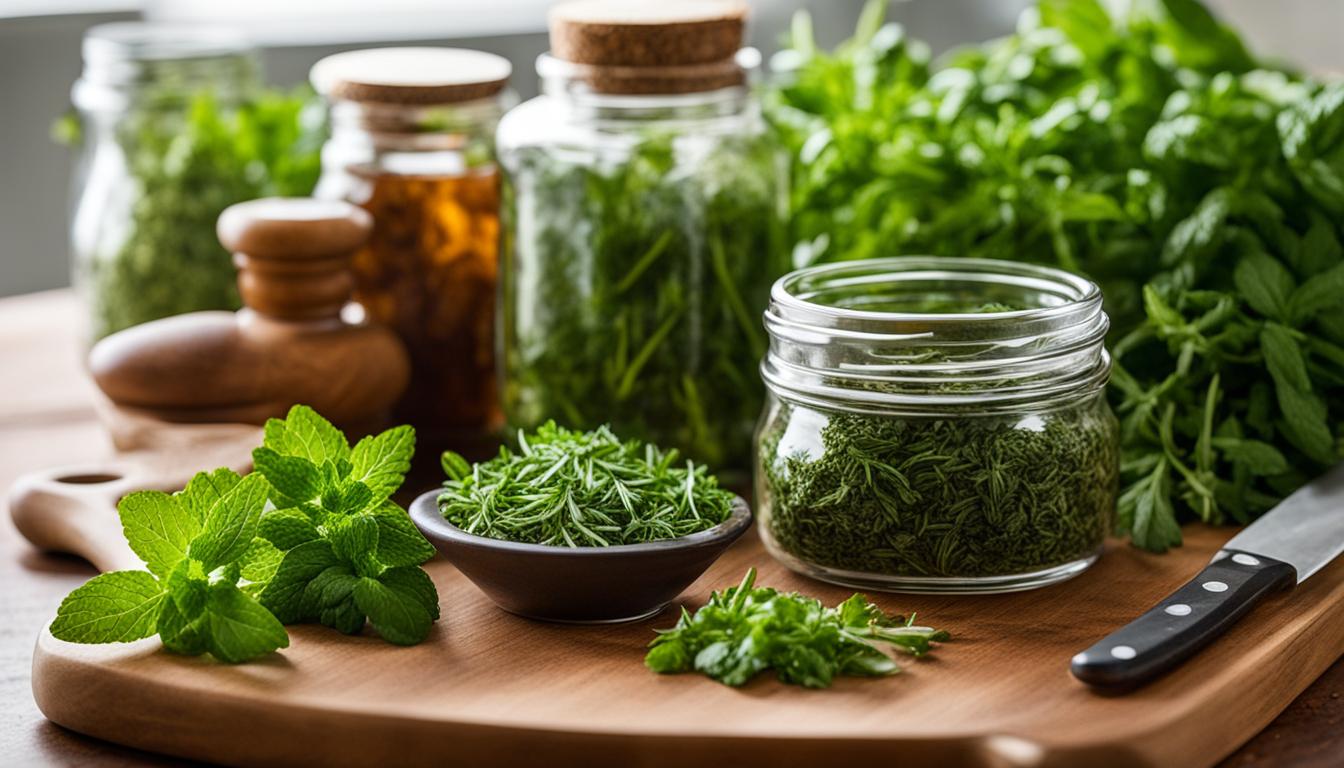Maintaining fresh breath is essential for a confident smile and positive interactions. However, many store-bought mouth fresheners contain artificial ingredients that can harm your oral health. But worry not, because I have the perfect solution for you – DIY herbal mouth fresheners! By creating your very own homemade oral fresheners, you can enjoy the benefits of natural breath boosters without any of the unwanted additives.
Key Takeaways:
- Create your own DIY herbal mouth fresheners to achieve natural breath boosters.
- Store-bought mouth fresheners may contain artificial ingredients that can be detrimental to your oral health.
- Bad breath can be caused by various factors, including trapped food particles and dehydration.
- Essential oils like peppermint, spearmint, lemon, and more can be effective in freshening breath.
- You can easily make your own mouth freshener spray with essential oils, water, and a glass spray bottle.
The Negative Effects of Commercial Mouth Fresheners
Many commercial mouth fresheners, such as gum, mints, and breath sprays, contain artificial ingredients that can have negative effects on your oral health. These products often contain artificial flavors, dyes, and preservatives, which can be detrimental to your overall well-being. It’s important to be aware of the potential dangers associated with these artificial ingredients and consider natural alternatives for freshening your breath.
One of the commonly found artificial ingredients in commercial mouth fresheners is alcohol. Breath sprays, in particular, tend to have alcohol as the first ingredient. Alcohol can dry out your mouth, reducing saliva production, and exacerbating bad breath in the long run. This can be concerning for those who rely on breath sprays to quickly freshen their breath throughout the day.
Moreover, artificial flavors, dyes, and preservatives found in commercial mouth fresheners can negatively impact your oral health. These additives may cause irritation, sensitivity, or allergic reactions in some individuals. Additionally, the consumption of excessive artificial ingredients can contribute to an imbalance of oral bacteria, leading to dental problems such as tooth decay and gum disease.
“The use of artificial ingredients in mouth fresheners can harm your oral health and overall well-being. Opting for natural alternatives can provide a safer and more effective solution.” – Dr. Kelly Thompson, Dentist
By choosing to make your own DIY herbal mouth fresheners, you can avoid these negative effects and prioritize your oral health. Homemade oral fresheners allow you to have full control over the ingredients, ensuring that you are using natural alternatives to freshen your breath effectively. Not only will you be able to enjoy the benefits of natural ingredients, but you’ll also have the satisfaction of knowing exactly what you’re putting into your mouth.
Common Causes of Bad Breath
Bad breath, also known as halitosis, can be caused by various factors that contribute to an unpleasant odor in the mouth. Understanding the common causes of bad breath can help you address the issue and maintain fresh breath throughout the day.
Lingering Food Odors
One of the primary causes of bad breath is the presence of lingering food odors in the mouth. When food particles get stuck between the teeth or on the tongue, bacteria break them down and release foul-smelling gases. Strong-smelling foods like onions, garlic, and certain spices can also contribute to persistent bad breath.
To combat lingering food odors, it is essential to practice good oral hygiene. Regular brushing and flossing can help remove food particles and plaque, reducing the chances of bacteria breaking down and causing bad breath. Additionally, incorporating a tongue scraper into your oral care routine can help remove bacteria and debris from the surface of the tongue.
Dehydration
Dehydration is another common cause of bad breath. When the body doesn’t have enough water, it can result in reduced saliva production. Saliva helps cleanse the mouth by washing away food particles and maintaining a healthy oral environment. Without sufficient saliva, bacteria can thrive and produce odorous compounds, leading to bad breath.
To prevent dehydration and maintain adequate saliva production, it is important to stay hydrated throughout the day. Drink plenty of water and limit the consumption of dehydrating beverages such as alcohol and caffeine. Chewing sugar-free gum or sucking on sugar-free mints can also stimulate saliva production and alleviate dry mouth.
Other Causes
While food odors and dehydration are common causes of bad breath, there can be other underlying factors as well. These may include:
- Poor oral hygiene
- Gum disease
- Smoking and tobacco use
- Respiratory infections
If you have persistent bad breath despite practicing good oral hygiene and addressing common causes, it is recommended to consult with a dentist or healthcare professional for further evaluation and guidance.
By understanding the common causes of bad breath, you can take proactive steps to maintain fresh breath and improve your oral health. Regular brushing, flossing, and tongue cleaning, along with adequate hydration, can go a long way in preventing bad breath associated with food odors and dehydration.
Effective Essential Oils for Freshening Breath
Certain essential oils are known for their breath-freshening properties. Including these oils in your DIY herbal mouth fresheners can not only freshen your breath but also offer additional benefits.
Peppermint: Known for its cooling and refreshing properties, peppermint essential oil is a popular choice for freshening breath. Its strong aroma helps mask odors and leave your breath feeling minty fresh.
Spearmint: Similar to peppermint, spearmint essential oil provides a refreshing burst of flavor and works well as a breath freshener. Its pleasant scent helps combat bad breath while leaving a clean and revitalizing taste.
Lemon: Lemon essential oil has a bright and citrusy scent that can help eliminate unpleasant odors and freshen your breath. Its natural antibacterial properties also contribute to maintaining oral hygiene.
Wild Orange: The zesty and uplifting aroma of wild orange essential oil not only freshens your breath but also energizes your senses. Its natural cleansing properties can help remove bacteria and keep your mouth feeling clean.
Clove: Clove essential oil has a warm and spicy aroma that can effectively freshen your breath. It’s known for its antiseptic properties, which can help kill bacteria and promote oral health.
Cinnamon: Cinnamon essential oil provides a unique and invigorating flavor that freshens breath with its sweet and spicy scent. It’s also known to support healthy digestion and reduce oral bacteria.
Tea Tree: Tea tree essential oil is well-known for its powerful antibacterial properties. It can help neutralize bad breath and promote a healthy oral environment.
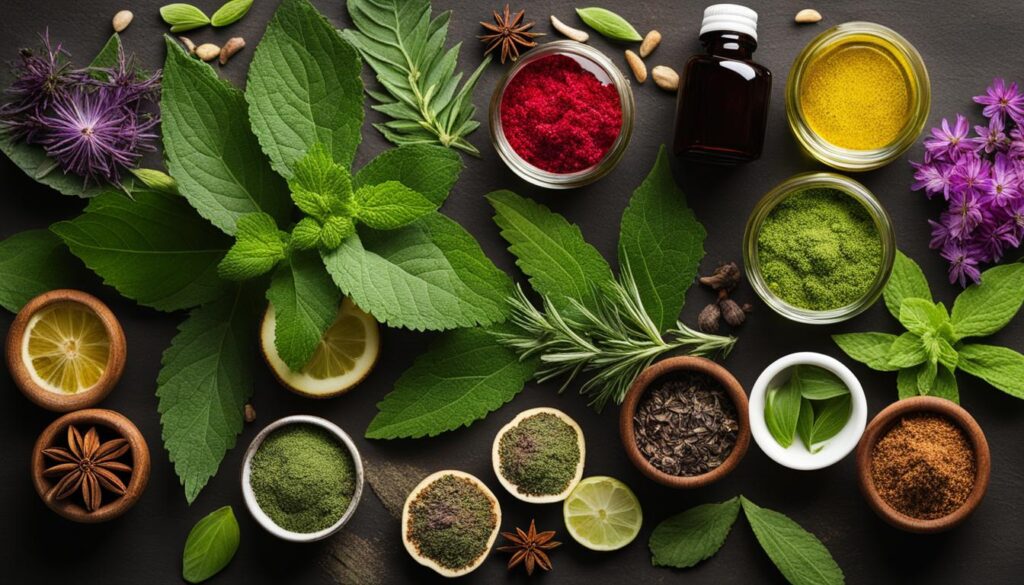
By incorporating these essential oils into your DIY mouth fresheners, you can enjoy the benefits of natural breath freshening while avoiding the artificial ingredients found in commercial products.
Making Your Own Mouth Freshener Spray
Creating your own mouth freshener spray is a simple and cost-effective way to keep your breath fresh and invigorated throughout the day. With just a few ingredients and a glass spray bottle, you can have a natural and refreshing DIY mouth freshener spray at your fingertips.
To make your own mouth freshener spray, you will need:
- Essential oils of your choice
- Water
- A pinch of salt
- A glass spray bottle
Start by selecting your preferred essential oils. There are several options that work well for freshening breath and providing a pleasant taste. Peppermint, spearmint, and citrus oils like lemon and orange are popular choices for their invigorating properties.
Tip: If you decide to use “hot oils” like cinnamon or clove, which can be strong and overpowering, start with just 1-2 drops and adjust according to your preference.
Next, add a pinch of salt to your spray bottle. This will help preserve the spray and extend its shelf life.
Fill the remainder of the bottle with water. It is recommended to use distilled water for optimal results.
Once you have added the salt, water, and essential oils to the bottle, secure the cap tightly and shake well to mix all the ingredients together.
Pro tip: A 2-ounce glass spray bottle is an ideal size for travel or keeping in your bag or pocket for on-the-go freshening.
To use your DIY mouth freshener spray, simply open your mouth slightly, position the spray bottle a few inches away from your mouth, and give a quick spritz. The refreshing mist will freshen your breath, leaving a pleasant taste in your mouth.
You can use your mouth freshener spray after meals, before meetings, or whenever you want to maintain fresh breath throughout the day. Remember to shake the bottle well before each use to ensure the ingredients are well mixed.
Creating your own mouth freshener spray not only allows you to customize the ingredients to your taste preferences but also gives you a natural and effective alternative to commercial sprays that may contain artificial additives.
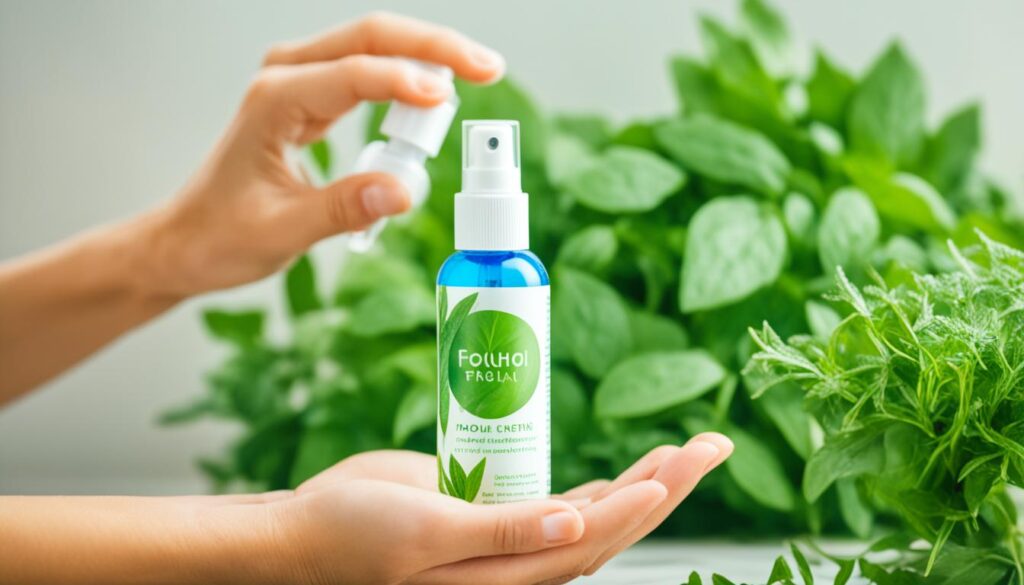
With just a few simple steps, you can enjoy the benefits of a homemade mouth freshener spray and confidently tackle any situation with fresh breath.
Using Essential Oil Blends for Mouth Freshener Spray
When it comes to creating mouth freshener sprays, essential oil blends offer a wonderful solution. Blends like doTERRA OnGuard and Young Living Thieves combine multiple essential oils to not only freshen the breath but also provide immune-boosting properties. These blends are carefully curated to maximize the benefits of each oil, creating a powerful combination that can enhance your mouth spray’s effectiveness.
If you’re wondering how to use essential oil blends in your mouth freshener spray recipe, it’s quite simple. Start by securing a 2-ounce glass spray bottle, which is the perfect size for on-the-go freshness. Then, extract the goodness of these essential oil blends by adding around 10 drops to your spray bottle. Make sure to shake the bottle gently to distribute the oils evenly.
It’s important to note that each blend has its unique composition and properties. For instance, doTERRA OnGuard contains essential oils like Wild Orange, Cinnamon, Clove, Eucalyptus, and Rosemary. On the other hand, Young Living Thieves is a blend of Clove, Lemon, Cinnamon Bark, Eucalyptus Radiata, and Rosemary essential oils. Both options offer a refreshing aroma along with potential immune-boosting benefits.
By incorporating these essential oil blends into your mouth freshener spray, you can enjoy the benefits of their natural ingredients. From their aromatic properties to their potential immune system support, these blends provide a holistic approach to oral hygiene.
Essential Oil Blend Comparison
| Essential Oil Blend | Main Ingredients | Benefits |
|---|---|---|
| doTERRA OnGuard | Wild Orange, Cinnamon, Clove, Eucalyptus, Rosemary | Freshens breath, Immune-boosting |
| Young Living Thieves | Clove, Lemon, Cinnamon Bark, Eucalyptus Radiata, Rosemary | Freshens breath, Immune-boosting |
These essential oil blends are popular choices for creating mouth freshener sprays, thanks to their powerful combination of natural ingredients. However, always remember that essential oils should not be consumed internally by children under 13 years old without consulting a healthcare professional.
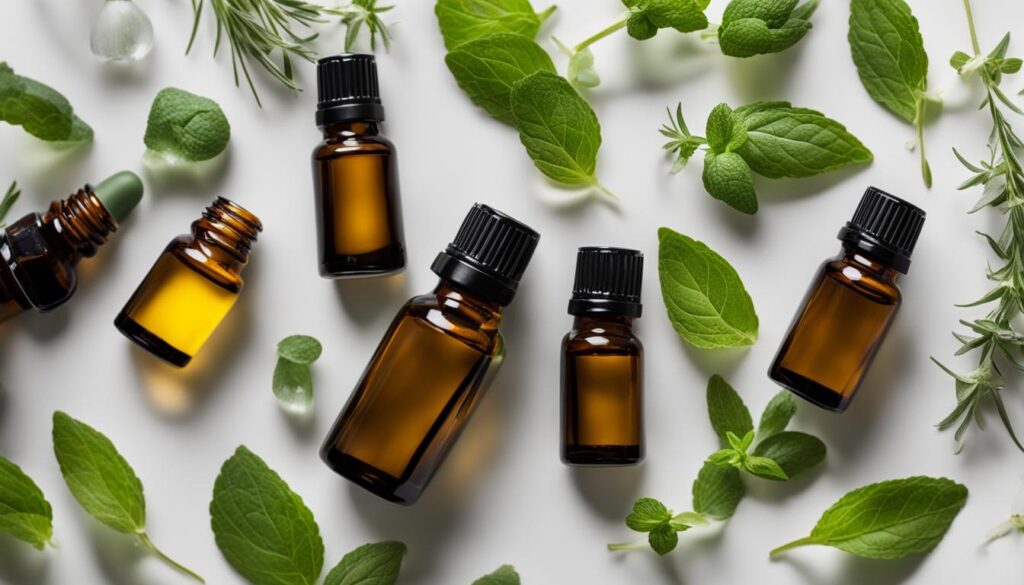
DIY Breath Spray Recipe – 2-Ounce Bottle
To create a DIY breath spray, gather the following ingredients:
- A 2-ounce glass spray bottle
- Essential oils of your choice
- Distilled water
- A pinch of sea salt
Start by filling the glass spray bottle with distilled water, leaving some space at the top for the other ingredients. Add 10 drops of your preferred essential oils to the bottle. The choice of essential oils depends on personal preference, but options like peppermint, spearmint, or lemon are popular for their refreshing properties.
Next, sprinkle a pinch of sea salt into the bottle. The salt helps preserve the spray and extend its shelf life. Screw the spray bottle cap tightly and shake well to ensure all the ingredients are well combined.
This DIY breath spray recipe provides a natural and refreshing alternative to commercial breath sprays. Adjust the number of essential oil drops according to your preference, but be cautious not to add too much, as some essential oils can be strong.
Shake well before each use to ensure the ingredients are evenly distributed throughout the spray. This spray is convenient to carry with you and can be used after meals or whenever you need to freshen your breath.
Give this DIY breath spray a try and enjoy the benefits of fresh breath without the use of artificial ingredients or chemicals!
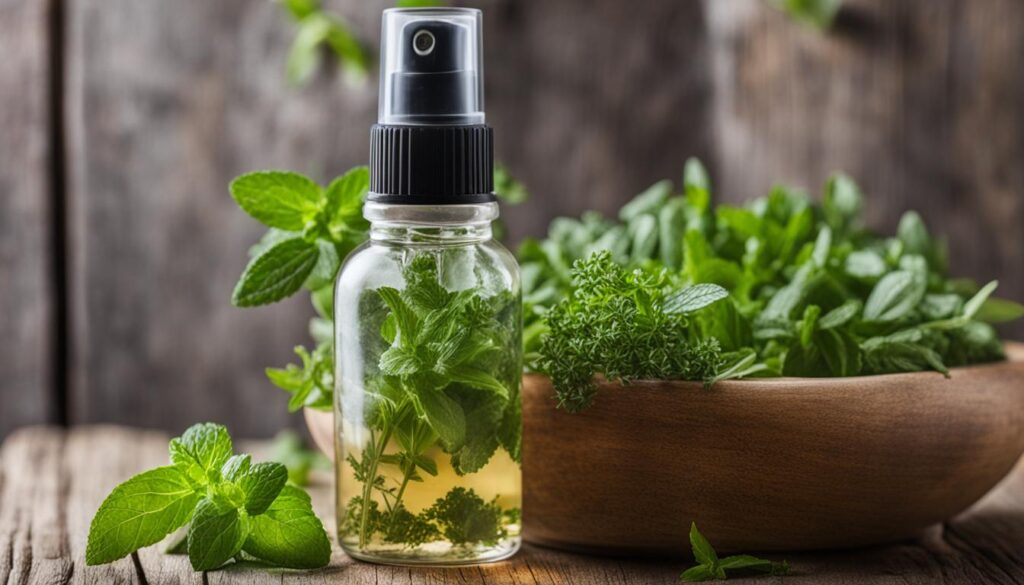
Why Choose a 2-Ounce Glass Spray Bottle?
A 2-ounce glass spray bottle is an ideal choice for this DIY breath spray recipe for several reasons:
- Glass is non-reactive, ensuring that the essential oils remain pure and uncontaminated.
- It is a convenient size for carrying in your purse, pocket, or travel bag.
- Glass is eco-friendly and can be reused, reducing plastic waste.
The 2-ounce capacity allows for multiple uses, ensuring you have a fresh breath spray available whenever you need it.
Choosing Essential Oils for Your Mouth Spray
When selecting essential oils for your mouth spray, it’s important to choose oils that are safe for internal use. Essential oils like cinnamon, clove, orange, and lemon are all great options to consider. These oils not only freshen the breath but also provide additional benefits, such as soothing a sore throat or boosting the immune system. Experiment with different combinations to find your preferred flavor profile.
Benefits of Essential Oils for Mouth Spray
Essential oils have long been used for their therapeutic properties, and incorporating them into your mouth spray can provide various benefits:
- Cinnamon: Known for its antiseptic properties, cinnamon essential oil can help fight bacteria that cause bad breath, while its pleasant aroma adds a hint of warmth to your mouth spray.
- Clove: Clove essential oil has strong antimicrobial properties and can help alleviate dental pain. Its distinctive flavor adds a unique twist to your mouth spray.
- Orange: Orange essential oil has a refreshing citrus scent that not only freshens the breath but also uplifts the mood. It is also known for its antimicrobial properties.
- Lemon: Lemon essential oil has a zesty, invigorating aroma that helps freshen the breath and promotes a clean, healthy mouth. It is also packed with antioxidants.
Feel free to customize your mouth spray by combining different essential oils. For example, a blend of cinnamon and clove can provide a warm, spicy flavor, while a combination of orange and lemon can create a citrusy burst of freshness.
| Essential Oil | Main Benefits |
|---|---|
| Cinnamon |
|
| Clove |
|
| Orange |
|
| Lemon |
|
Experimenting with different essential oil combinations allows you to create a unique mouth spray that suits your preferences and provides the desired benefits. Whether you prefer a spicy, citrusy, or refreshing flavor, essential oils offer a natural and aromatic solution to freshen your breath.
Alternative Homemade Mouth Fresheners
In addition to DIY breath sprays, there are other alternatives to store-bought mouth fresheners. Flavored toothpicks infused with essential oils can provide a refreshing sensation and help combat bad breath. Natural mouthwashes made with essential oils and water can also be used to freshen the breath and maintain oral hygiene. Exploring these homemade options allows you to prioritize natural ingredients and customize your mouth freshening routine.
Flavored Toothpicks
Flavored toothpicks offer a unique and enjoyable way to freshen your breath. Infused with essential oils, these toothpicks provide a burst of flavor while helping to eliminate lingering odors. Simply chew on a flavored toothpick after meals or whenever you need a quick breath freshener. Not only do they freshen your breath, but they also give your taste buds a delightful treat.
Natural Mouthwash
Avoid harsh chemicals and alcohol found in commercial mouthwashes by creating a natural alternative at home. Mix a few drops of your favorite essential oil, such as peppermint or tea tree, with water to create a refreshing mouthwash. Gargle with the mixture for 30 seconds to a minute, ensuring it reaches all parts of your mouth. This DIY mouthwash not only freshens your breath but also helps maintain a healthy oral environment.
DIY Breath Freshening Techniques
Aside from flavored toothpicks and natural mouthwash, there are additional DIY breath freshening techniques you can incorporate into your routine. Here are a few ideas:
- Chew on fresh herbs like parsley or mint leaves to naturally freshen your breath.
- Rinse your mouth with a mixture of baking soda and water to neutralize odors.
- Scrape your tongue gently with a tongue scraper to remove bacteria and freshen your breath.
- Drink plenty of water throughout the day to stay hydrated, as dehydration can contribute to bad breath.
By using these alternative homemade mouth fresheners, you can embrace natural ingredients and personalize your breath-freshening routine to suit your preferences.
| Flavored Toothpicks | Natural Mouthwash | DIY Breath Freshening Techniques |
|---|---|---|
| Offers a burst of flavor | Avoids harsh chemicals and alcohol | Uses natural remedies to combat bad breath |
| Provides a delightful treat for your taste buds | Creates a refreshing mouthwash with essential oils | Includes chewing on fresh herbs and rinsing with baking soda |
| Eliminates lingering odors | Maintains a healthy oral environment | Scrapes tongue and promotes hydration |
Conclusion
Creating your own DIY herbal mouth fresheners provides a natural and effective solution for freshening your breath. By avoiding artificial ingredients and opting for essential oils and natural elements, you can enjoy lasting freshness without the potential negative effects of commercial mouth fresheners.
Experiment with different essential oils and recipes to find the perfect combination that suits your taste and breath-freshening needs. Peppermint, spearmint, lemon, wild orange, clove, cinnamon, and tea tree are excellent options to include in your homemade oral fresheners.
Within the comfort of your home, prioritize your oral health by embracing the power of DIY natural breath boosters. Discover the joy of fresh breath that comes from using homemade mouth fresheners made with love and care.
FAQ
Why should I make DIY herbal mouth fresheners at home?
Making your own DIY herbal mouth fresheners at home allows you to achieve natural breath boosters without the use of artificial ingredients found in store-bought products. By creating your own homemade oral fresheners, you have full control over the ingredients and can choose natural alternatives to freshen your breath effectively.
What are the negative effects of commercial mouth fresheners?
Many commercial mouth fresheners contain artificial flavors, dyes, and sugars that can have negative effects on your oral health. For example, breath sprays often contain alcohol as the first ingredient, which can dry out your mouth and worsen bad breath. By opting for DIY herbal mouth fresheners, you can avoid these artificial ingredients and choose natural alternatives.
What are the common causes of bad breath?
Bad breath can be caused by various factors, including food particles trapped between teeth, consumption of odor-causing foods like onions and garlic, and dehydration. It is essential to maintain good oral hygiene practices, such as regular brushing and flossing, to minimize bad breath. DIY herbal mouth fresheners can complement these practices and provide a natural solution to combat bad breath.
What are effective essential oils for freshening breath?
Peppermint, spearmint, lemon, wild orange, clove, cinnamon, and tea tree are excellent essential oils for freshening the breath. These oils not only freshen the breath but also offer additional benefits, such as boosting the immune system and soothing a sore throat.
How can I make my own mouth freshener spray?
Creating your own mouth freshener spray is a simple process that requires essential oils, water, a pinch of salt, and a glass spray bottle. Choose your preferred essential oils, dilute any “hot oils” like cinnamon or clove, add a small amount of salt to preserve the spray, and mix the ingredients in the glass spray bottle. Spritz into your mouth after eating or whenever you need to freshen your breath.
Can I use essential oil blends for mouth freshener spray?
Yes, essential oil blends like doTERRA OnGuard and Young Living Thieves are excellent choices for creating mouth freshener sprays. These blends contain a combination of essential oils that not only freshen the breath but also provide immune-boosting properties. Using 10 drops of the blend in a 2-ounce glass spray bottle can enhance the effectiveness of your mouth spray.
What is the DIY breath spray recipe for a 2-ounce bottle?
To create a DIY breath spray, you will need a 2-ounce glass spray bottle, essential oils of your choice, distilled water, and a pinch of sea salt. Add 10 drops of essential oils for adults, adjust based on personal preference, and shake well before each use to ensure all the ingredients are well combined. This recipe offers a natural and refreshing alternative to commercial breath sprays.
What essential oils should I choose for my mouth spray?
When selecting essential oils for your mouth spray, choose oils that are safe for internal use. Excellent options include cinnamon, clove, orange, and lemon. These oils not only freshen the breath but also provide additional benefits, such as soothing a sore throat or boosting the immune system. Experiment with different combinations to find your preferred flavor profile.
Are there alternative homemade mouth fresheners?
Yes, there are other alternatives to store-bought mouth fresheners. Flavored toothpicks infused with essential oils can provide a refreshing sensation and help combat bad breath. Natural mouthwashes made with essential oils and water can also be used to freshen the breath and maintain oral hygiene. Exploring these homemade options allows you to prioritize natural ingredients and customize your mouth freshening routine.
Why should I make DIY herbal mouth fresheners?
Creating your own DIY herbal mouth fresheners provides a natural and effective solution for freshening your breath. By avoiding artificial ingredients and opting for essential oils and natural ingredients, you can enjoy lasting freshness without the potential negative effects of commercial mouth fresheners. Experiment with different essential oils and recipes to find the perfect combination that suits your taste and breath-freshening needs. Prioritize your oral health and embrace the power of DIY natural breath boosters.

